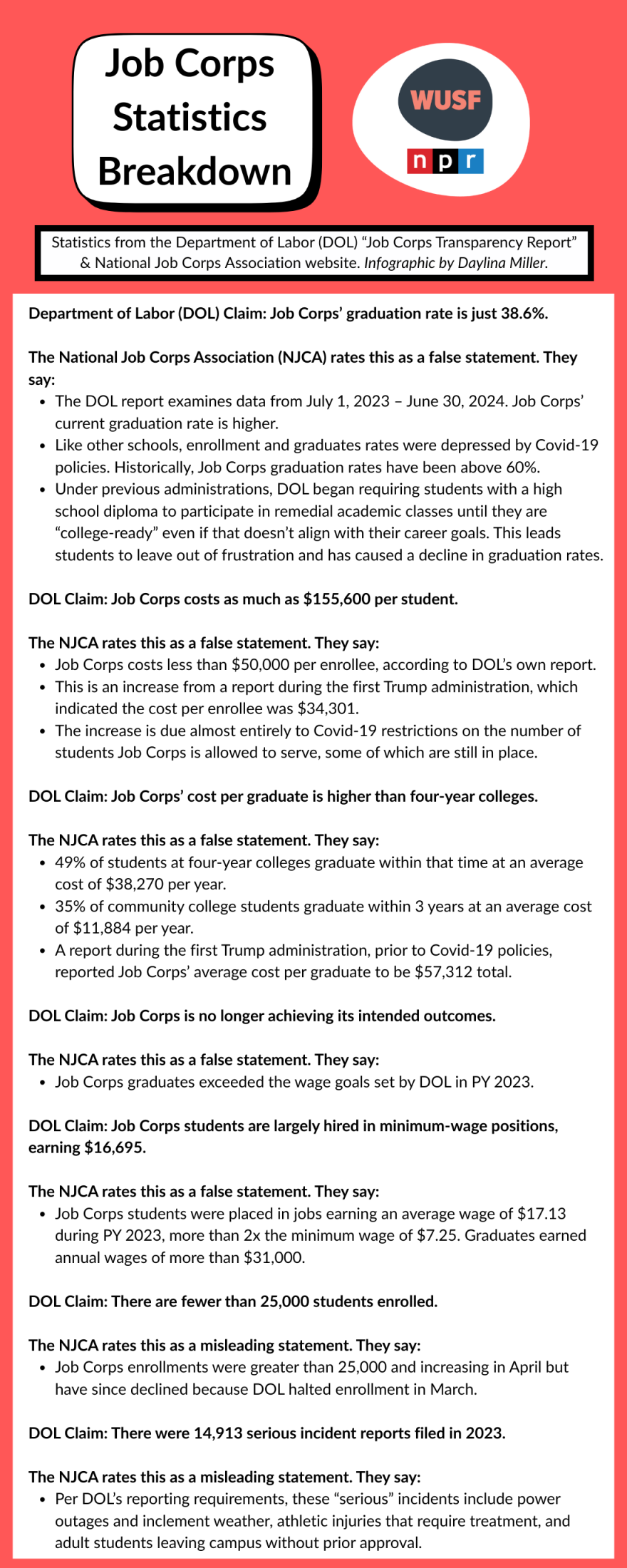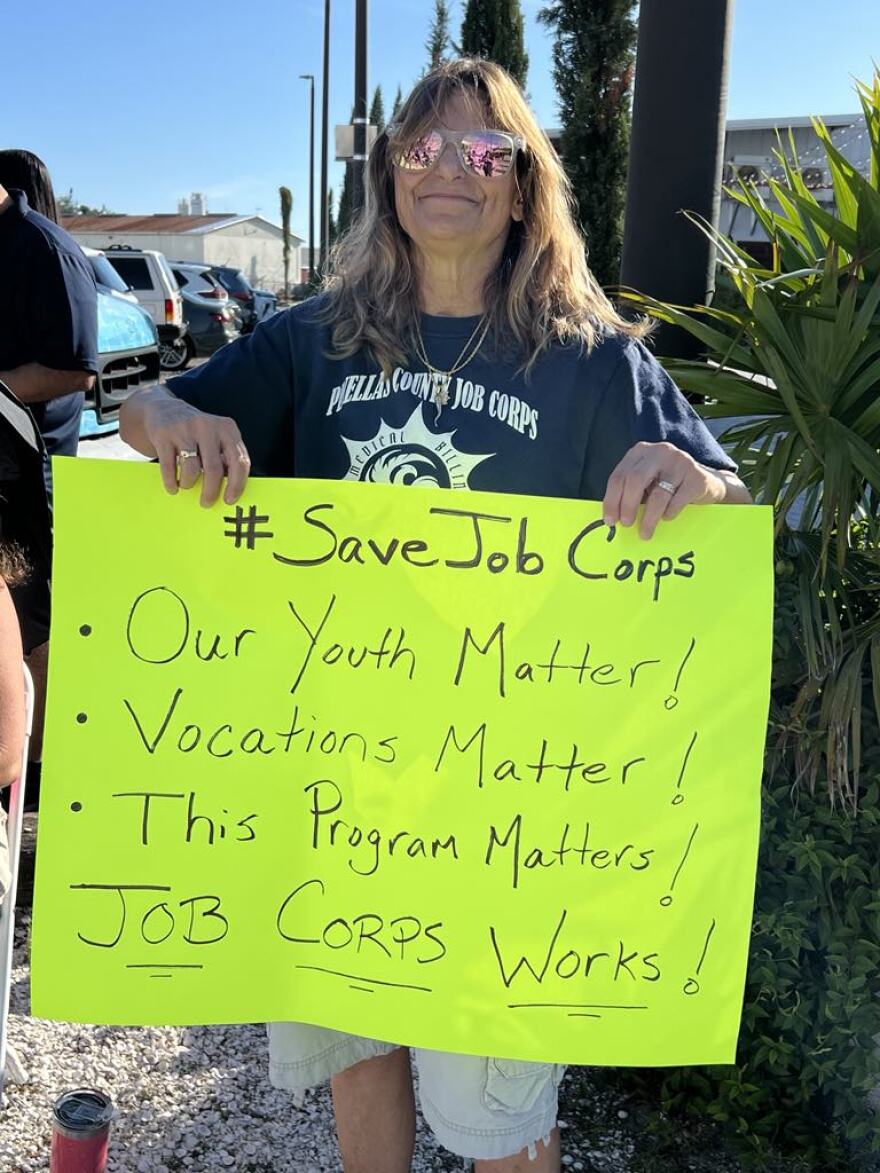On a small stage at the Warehouse Arts District Association in St. Petersburg, Cranston Cumberbatch leads students, graduates, employees, community leaders, and Job Corps supporters in a chant.
“Pinellas! County! Job! Corps! Pinellas County! Job Corps! Can I get a P-C-J-C-C! P-C-J-C-C!”
Cumberbatch, who leads the performing arts program at the Pinellas County Job Corps Center, kept the vibe up at an event Tuesday that came about from fear and uncertainty.
The Department of Labor’s Job Corps Directive
Earlier in the month, the U.S. Department of Labor announced it was closing at least 100 Job Corps centers nationwide, including the one in St. Pete.
The program was part of the “Economic Opportunity Act,” passed by Congress in 1964 and enacted into law by President Lyndon B. Johnson as part of his War on Poverty.
ALSO READ: One less option for low-income Tampa-area young adults as Job Corps Center is set to close
Since then, Job Corp touts preparing more than three million low-income 16- to-24-year olds for the real world, giving them free housing, an education, vocational training, and military enlistment support.
The DOL’s directive to centers was to close by June 30.
Many students — and folks in the community like therapists who refer clients there — found out about it on the news, which was awash with confusion, uncertainty, and even misinformation from the federal government, the National Job Corps Association (NJCA) said.
The DOL said the program costs too much, and isn’t effective. The NJCA refutes that, challenging the statistics reported by the department.

Student success stories
The event in St. Pete was one of many across the state and country standing in support with students, past and present, who have flooded social media with their success stories. Here, too, students shared their experiences, several choking up in the process.
22-year-old Jaliya Ames, with her teal hair and bright smile, is a Job Corps student working toward her eventual dream of being an OB/GYN. She went from living in her car in 20-degree weather in Georgia to living at the center.

"Something had to be done to change my life without money, and Job Corps is something that sounds unbelievable when it comes to completely free, but it really is,” Ames said.
Ames can live with her grandmother if the center shuts down, but she noted the difficulty of paying for an education on her own.
She said that in her short stint at Job Corps so far, the program has given her skills she’d have never received otherwise, skills that will help her keep moving forward regardless of Job Corps fate.
“You come in there, you get the education, you get the free food, you get the free support, and you get the genuine love from the right people, and you succeed. And it sounds like a dream or a fairy tale, but it's real. As long as you come in there for the right reasons, the right things will happen.”
But not everyone is that fortunate, she said. Some of her peers will become homeless as she once was.
“There's a lot of people who say, ‘Oh, just mend your friendships and mend your relationships.’ Sometimes there's no relationships to mend. Sometimes these people are dead or in jail. Sometimes these people aren't even in the right mindset to even take care of you how you need to be taken care of,” she said.
“Hotels cost money. Shelters are ‘up to here’ with people. So people really need to think about that instead of thinking, ‘Oh, it's just another option. It's always another option.’
"Yeah, there's always another door. But sometimes the door that you're in is where you're comfortable, where you're safe, [that] could be the best outcome for you.”
Lady Annasia Johnson is a high school dropout, but Job Corps enabled her to get her GED. There, she found a love for carpentry, a trade she knows she’d be successful at. And maybe she will be someday, she said, but because Job Corps may still be shut down, she’s decided to enlist in the Army.
“I was very, extremely sad, because I did want to stay at Job Corp to finish getting my trade. And then also that there were a few of us that were going to be homeless and not going home to anything,” she said.
Brandon Allen has been with Job Corps for eight months. He left college after it got too expensive to continue, and left to start a new journey in Job Corps’ medical program.
He said he immediately started panicking when he heard about the Job Corps' closure. He said there’s been more of a focus on the negatives than the positives of the program.
“I think it's been benefiting so many people, and some people have left more successful than they have before. I think they've left with advanced trainings and gone to different states…A lot of people came in homeless and left with a great job, that good-paying job, able to get apartments, like it's helping so many people just be able to get by.”
A teacher’s perspective
Debbie Garrett has been an art teacher at the Pinellas County Job Corps Center for 13 years and spoke to the inclusion of art in the program.
“Art and academics (are) vital in order to achieving your goals.

It's a balance of the brain,” Garrett said.
She said students improve their ability to retain information when they have a well-rounded education, and that balance has led many students to medical and pharmaceutical careers locally.
Local pharmacies and nursing homes are among the many companies and organizations that let Job Corps students get hands-on experience to obtain their certifications.
She said she was crushed and frustrated when she heard about the closures.
“I think that the government did not do due diligence. I always said that the numbers were inflated and deflated,” Garrett said. “I think that when they started looking at Job Corps across America, they didn't take into consideration the homelessness, they didn't take in consideration the success stories.
"They didn't take in consideration what happens to a community when you don't have plumbers and electricians and carpenters and that's concerning for me.”
Student Jaliya Ames echoed that sentiment.
"You have to be there to know what's happening. You can't just go off systematic and electronic data, because if you actually were there to see it every day, you would know that there's a lot of success,” she said.
Until they’re told otherwise, Garrett said, they’ll continue to do their jobs with the passion they’ve always brought to the program because the students need them now more than ever.
What to know about Jobs Corp moving forward
Last week, U.S. District Judge Andrew Carter in New York issued a temporary restraining order following a lawsuit filed by a trade group representing Job Corps contractors,” WLRN reported. The suit alleges the DOL violated federal law by abruptly shuttering a Job Corps program that operates 17 centers.
The ruling temporarily blocks the DOL from terminating contracts or halting operations until a June 17 hearing in New York.
For now, students can continue to live on campus, but the future of that housing, and the entire program, is uncertain.




